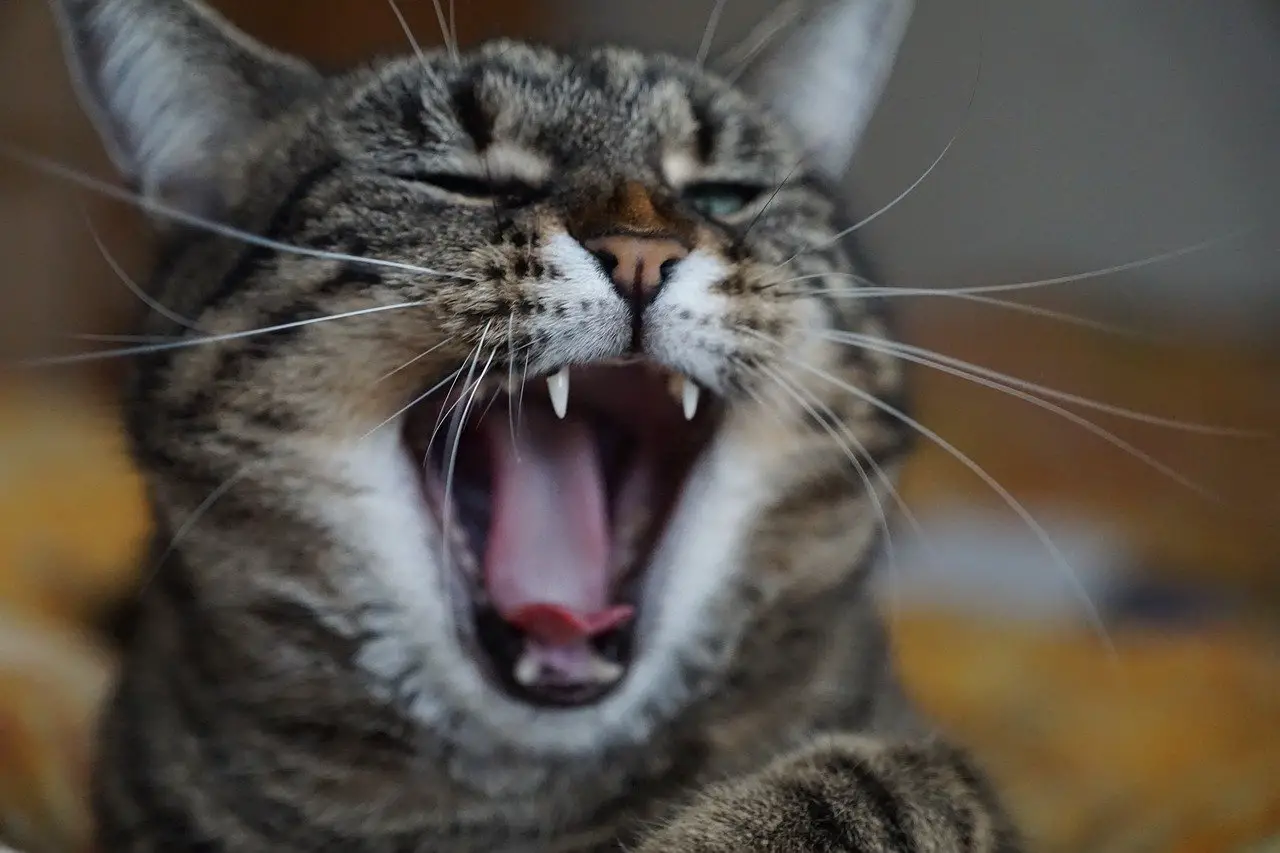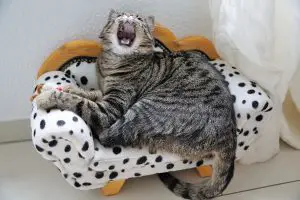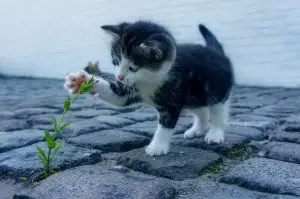You may find it super strange if your old cat has suddenly started yowling and crying loudly out of nowhere. It turns out that behavior is completely normal but may be indicative of a problem:
- Pain
- Hyperthyroidism
- Hypertension
- Sensory decline
- Cognitive decline
- Attention seeking
Why Does My Old Cat Cry All the Time
Cats make for great pets. They are cuddly (but not too cuddly), playful (but not too playful), and amazingly independent — the perfect calm companion! That is why you may find it super strange if your old cat has suddenly started yowling and crying loudly out of nowhere. It turns out that sort of behavior is completely normal, but it’s indicative of a problem. So, read on to find the answers to the question, Why does my old cat cry all the time?
My Cat Keeps Me up at Night
Some of the most common complaints are:
- “I can’t sleep at night — my cat just won’t stop yowling!”
- “I think my cat is in pain — it cries all the time, even at night.”
- “My cat suddenly started yowling out of nowhere. This has continued for weeks; what’s wrong?”
It’s important to mention the complaints because this article is not about cats excessively meowing or yowling in general. It’s about geriatric cats that are literally screaming and vocally showing they are distressed or in pain.
Reasons for the Yowling
Now that we know what the common owners’ complaints are, let’s take a look at some of the possible reasons for the crying.
Pain
That one may be hard to prove because, obviously, you can’t know if your cat is in pain or not. However, if you are aware of certain medical conditions it has, such as arthritis, dental disease, neurological problems, etc., then the yowling may be associated with the pain that comes from them.
Hyperthyroidism
Unfortunately, hyperthyroidism is quite common among geriatric cats. In fact, veterinarians report that roughly one in ten cats aged ten or older is diagnosed with the hyperthyroid disease.
Simply put, hyperthyroidism refers to an overactive thyroid gland. It occurs when your cat’s thyroid produces excessive amounts of the hormone thyroxine. That boosts your feline friend’s metabolism, which can cause weight loss and irregular heartbeat.
Here are some of the other symptoms you may spot:
- Yowling — your cat is quite vocal; it’s yowling at night without any particular reason
- Huge appetite (but your cat remains skinny or even loses weight)
- Thirst (higher than usual)
- Hyperactivity (your feline friend seems quite playful, it follows you around the house, and seeks attention)
- High blood pressure
- Diarrhea, etc.
If you spot any sudden change in your cat’s physical appearance or behavior, or you’re suspicious of it dealing with hyperthyroidism, consult with your vet. If left untreated, this condition may not only lead to your cat crying all the time but also physically suffering in the long term.
Hypertension
High blood pressure (called hypertension) could be the cause of your cat’s behavior. Though much more common in people, high blood pressure affects other animals too. Essentially, there are changes in the blood vessels that make blood circulation more difficult. Consequently, there is an increase in the flow resistance, which all leads to high blood pressure.
While many humans have the so-called primary hypertension (there is no clearly identifiable cause), the case with animals is different. Usually, they have secondary hypertension, caused by hyperthyroidism, diabetes, kidney disease, etc.
If your cat has hypertension, your vet should be able to help treat the primary disease. That will normalize the blood pressure and stop the constant yowling.
Sensory Decline
It sounds super scary, no doubt, but the sensory decline is part of the aging process. Just like humans, many cats deal with that when they get older. Visual and auditory perception is crucial for animals. Therefore, if your furry friend is losing one of those senses, it is normal for it to be confused, irritated, and even frightened. That’s when the crying at night begins.
Remember, the fact that animals can’t tell you they are suffering doesn’t mean they aren’t. So don’t be that person who bashes their cat for yowling at night; there is probably a good reason for that!
Does your feline friend seem disoriented? Do you see unusual changes in behavior, alertness, and activity? If yes, and the aforementioned are accompanied by constant yowling, immediately make an appointment with your veterinarian. They will do a thorough examination and tell you what’s wrong.
Cognitive Dysfunction
Along with the sensory decline, cognitive dysfunction is another thing that comes with aging. Feline cognitive dysfunction (FCD) is related to:
- Changes in awareness
- Deficits in memory and ability to learn
- Decreased responsiveness to stimuli, etc.
Now, don’t panic, your cat won’t forget you. However, it may seem confused and could start to forget some of the habits it has learned. For example, it may forget the location of its food bowl or litter box. Such cases are more common among quite old cats (aged fifteen and up) though, and even then, the veterinarian has to do a thorough check to see what’s going on.
Therefore, don’t switch to panic mode for any of the conditions mentioned. They are only a few of the possibilities that could explain the constant crying of your furry friend. The reason may be completely different, so, once again, I recommend consulting with your vet. They are the expert and should be able to tell if your cat is just acting up or there’s a problem that must be taken seriously.
And speaking of acting up…
Attention Seeking
I know how busy life can get — work, family, friends… We hardly get the time to sit down and relax for a minute, let alone play with our pets. However, your cat is not aware of that. Yes, cats are quite independent, but they are also affectionate and like interacting with you. If the only contact you have with it is when you clean its litter box and put food in its bowl, it is probably more than unhappy.
If you literally live as if you don’t have a cat at all, it is more than obvious it’s going to try to grab your attention. And if the occasional “meow!” doesn’t work, your furry friend will find another way to make you acknowledge its presence.
Being an obedient cat is not enough, ha?! I’ll show them who’s the boss! — thoughts of a cat at 3 A.M. You get the idea; if your puss is in great shape, it doesn’t have any medical problems, it’s walking around as if it owned the place, then the yowling might be indicative of lack of attention.
Remember, you chose to be a cat owner; you might as well try to be a good one. Try giving your feline friend more attention; be present. You surely love your cat, so show your affection! If that doesn’t work and the crying continues regardless of your efforts, go for a check with your vet and tell them everything you find strange in your furry friend’s behavior, so they can help adequately.
Final Thoughts
Cats are extremely interesting creatures. They have the mindset of royalty and the outer look of furry angels with claws — what better combination?
However, if your senior cat has started to act up (more than the usual) and makes a good night’s sleep utterly impossible, maybe it’s time for a vet check-up. There may be no problem and your cat might just like “singing,” but there is a chance it’s actually in pain and is trying to tell you it needs help. Therefore, whatever you do, don’t be mad at it because it ruins your sleep with its yowling. Think rationally, and check with your veterinarian — they should be able to answer the question, Why does my old cat cry all the time?
[su_box title=”Affiliate Disclosure”]This website is supported by its readers. Please assume that all links are affiliate links. If you make a purchase from one of the links we will make a commission from Amazon. Thank you.[/su_box]








